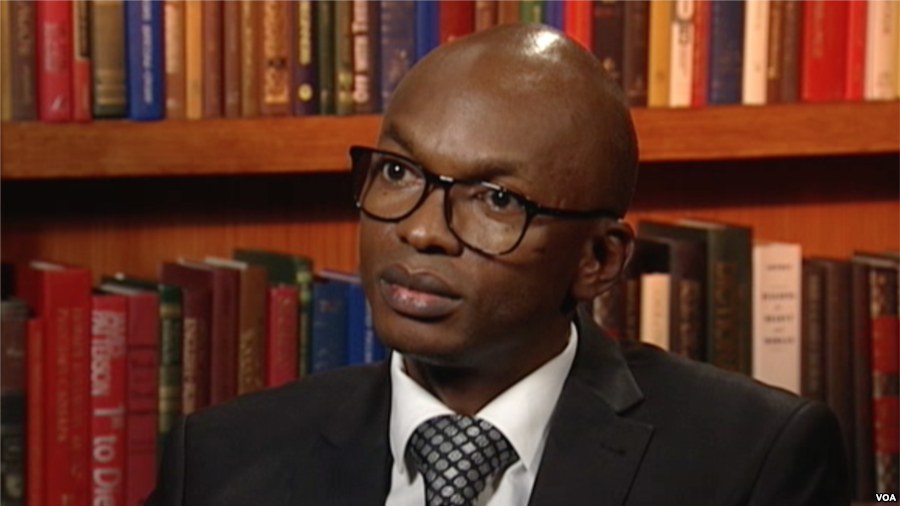Burundian Foreign Minister Alain Nyamitwe
Incumbent President Pierre Nkurunziza has been declared the winner of Burundi’s presidential election, which the Burundian opposition boycotted. Despite the boycott, other candidates’ names remained on the ballot, and the election commission reported that Agathon Rwasa had won 19 percent, Nkurunziza 69 percent.
President Obama, speaking in Kenya, and Secretary of State Kerry, speaking in Washington D.C., declared that the election results were not credible and called for talks between the government and the opposition.
The U.S. State Department said that the U.S. will “suspend its relationships with any group promoting instability in Burundi through violence.” Earlier, the State Department said that it did not support the May coup attempt in Burundi.
However, the U.S. has a history of supporting armed groups, coups, invasions and even assassination of heads of state in the region and around the world. Robin Philpot, author of “Rwanda and the New Scramble for Africa, from Tragedy to Useful Imperial Fiction,” says that we need to understand what happened in Rwanda to understand what is happening in Burundi today.
“It is very important to go through what happened in Rwanda in order to understand what’s going on in Burundi today. In Rwanda, there was an invasion from Uganda, under Museveni, the man who is still in power.
There are no two terms applied to Mr. Museveni. These were regiments in the Ugandan army who crossed the border and invaded on Oct. 1, 1990. They occupied part of the country and then they pursued a guerrilla war to wear down the government.
Now it’s important to notice that this is an invasion. It’s an invasion of a sovereign country. And then the imperial powers, the British and the Americans, and to a certain extent the French – the French at that time we’re backing the Rwandan government – but they all agreed we have to sit down and negotiate with this invading power, which the government did not want to do because this was a foreign army.”
The United Nations Charter obliges the U.N. to take action against the violation of any member state’s sovereignty, but no one at the U.N. did anything to stop the Ugandan invasion and war of aggression in Rwanda from 1990 to 1994. Speaking in “The Deluge,” a documentary film in progress, Ugandan American journalist Milton Allimadi said that the Rwandan massacres of 1994 would not have happened if Uganda’s violation of Rwanda’s sovereignty had been stopped in 1990.
“Why is Rwanda being allowed to be invaded by Uganda? Uganda had actually launched a war of aggression in 1990. And I said it then – and I maintain it up to today – that had that war of aggression been dealt with and had it been halted, the mass killings typically referred to as the genocide of 1994 never would have occurred.”
This history is vivid in the memory of many today because Southern Rwanda could easily serve as a base camp for an army attacking Burundi, as southern Uganda served the army that attacked Rwanda in the 1990s. Former Burundian officers who attempted a coup d’état in Burundi in May have declared war on Burundi, and some are reported to be sheltering in Rwanda, where President Kagame has called on President Nkurunziza to step down.
The Burundian army has been engaged by troops near its northern border with Rwanda and this week Aljazeera reported that young men in Rwandan refugee camps are being recruited to join a rebel force to fight in Burundi. Burundian Foreign Minister Alain Nyamitwe, speaking to The Voice of America, said that the Burundian government had asked the Rwandan government to prevent any action threatening Burundi’s security.
“We have received repeated reports that the alleged coup plotters of May 13, or some of them, are now in Rwandan territory. We have told the Rwandan government, through the appropriate channels, that this information does not reassure us and cannot leave us indifferent.
That is why we asked the Rwandan authorities, again through the appropriate diplomatic channels, to do everything in their power not only to prevent actions that would disturb the peace and security in Burundi – from their territory – but also to ensure that if our justice minister requests it, the Burundian coup plotters will be handed over to judicial authorities of Burundi.”
Rwanda and Burundi share not only a border but also the bi-polar majority-Hutu-minority-Tutsi demographic that has caused so much of the region’s history of mass violence.
The regional and ethnic tensions are no doubt real, the danger of mass violence great, but the African Great Lakes Region is so resource rich that the resource interests of the world’s industrial and military power elites are always in play behind the news.
Burundi has signed a lease to mine its nickel, cobalt and copper reserves with a Russian firm. And, like Rwanda, Uganda and Tanzania, Burundi shares a very geostrategic border with the eastern Democratic Republic of the Congo, a vast storehouse of strategic mineral reserves.






